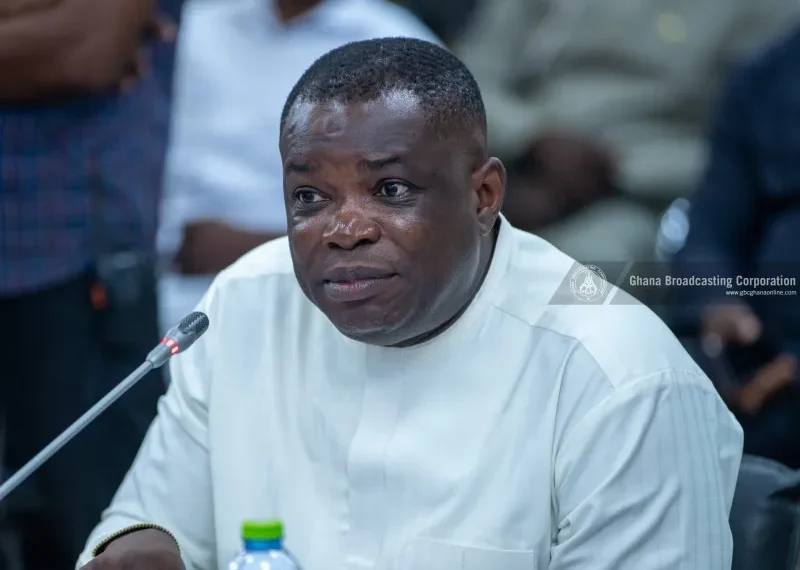The Minister for Roads and Highways, Hon. Governs Kwame Agbodza, has issued a firm call to cement producers in Ghana to reduce their prices to reflect the recent gains in the economy, particularly the stability of the Ghanaian cedi.
According to the Minister, while many sectors have adjusted their prices downward in response to favourable macroeconomic conditions, cement producers continue to maintain high prices, which he described as “unfair” and “rent-seeking.”
Speaking ahead of the rollout of a new massive road infrastructure project under the government’s flagship $10 billion Big Bush Agenda, the Roads Minister expressed concern that cement prices, which had previously surged due to import-related costs, have not been adjusted despite a reduction in the cost of importing key components like clinker.
“In the recent past, some cement producers increased their prices, claiming that the bulk of their inputs comes from abroad. Today, much of what is used to produce and sell cement is still imported. But the economic situation has changed, the dollar is down, and we expect those gains to be passed on to consumers.”
Minister for Roads and Highways, Hon. Governs Kwame Agbodza
Hon. Kwame Agbodza warned that the Ministry of Roads and Highways will now begin to factor price responsiveness into procurement decisions. “Henceforth, the Ministry will take a second look at all those producers who are refusing to pass on the gains to the public in determining where we direct the major government programs that use cement,” he stated.

He stressed that while the government is not imposing price controls, it reserves the right to prioritise purchases from cement producers who reflect the prevailing economic reality in their pricing.
The Minister noted that cement is a significant input in the construction of public infrastructure, including roads, schools, and hospitals, and any inflated pricing ultimately burdens the taxpayer.
“The price of cement is directly linked to the cost of a government project. And invariably or indirectly, it is the Ghanaian taxpayer who will pay for those projects. We cannot all work together as a country to make sacrifices and allow cement dealers alone to ignore the gains made.”
Minister for Roads and Highways, Hon. Governs Kwame Agbodza
Hon. Kwame Agbodza did not mince words in his criticism of current cement pricing, calling it “unacceptable” and challenging producers to justify why they continue to sell a bag of cement at GHS120, even as the importation cost of clinker — the major raw material — has declined.
“If you play back their own words to them, they argued that clinker was imported and the cost of import justified their price hikes. Today, if they make the calculation, it should be coming down. We haven’t increased the price of anything significantly to justify keeping the price of cement at GHS120.”
Minister for Roads and Highways, Hon. Governs Kwame Agbodza
GUTA’s Pledge
The Minister cited a recent GUTA (Ghana Union of Traders Association) meeting where an indication was given that cement prices would be reduced.
However, he lamented that no such reduction has been seen in actual retail outlets. “We are yet to see that reflected in the price of cement, where we buy our items at the hardware shop,” he said.

He further explained that although the cement component of government contracts is accounted for in cost estimations by surveyors and industry indices, the current market prices still do not align with what is considered fair and affordable.
“Contractors submit pricing, and surveyors build that into their assessments. But currently, those indices mean cement is still selling over GHS120. That is why the Ghanaian should be concerned. This is not just a contractor’s issue. It’s an issue for the ordinary Ghanaian.”
Minister for Roads and Highways, Hon. Governs Kwame Agbodza
In outlining the Ministry’s stance, the Minister made it clear that a major road infrastructure programme is about to be rolled out, and large volumes of cement will be required.
“In my small way, I’m saying that the government is about to unveil a massive road infrastructure project. We shall be ready to determine that cement used for government projects should be sourced from suppliers whose prices reflect the economic reality”.
Minister for Roads and Highways, Hon. Governs Kwame Agbodza
He noted that the government has not increased taxes on cement production or importation significantly, and this removes any justification for keeping prices high. He contrasted the actions of cement dealers with other sectors of the economy that have adjusted prices downwards.
“Nobody is saying that cement producers should collapse. But for the same reason truck drivers have reduced their prices, for the same reason fuel traders have reduced theirs, and for the same reason clothing sellers have done so — cement dealers must follow suit.”
Minister for Roads and Highways, Hon. Governs Kwame Agbodza
In closing, Hon. Kwame Agbodza called on the media and the Ghanaian public to join him in demanding fair pricing in the cement market.

“I’m not trying to control prices, but I believe that everyone, including yourselves, knows the price of cement does not reflect the current economic situation. What justification do we have for cement dealers not to make any attempt at reducing the prices?
“And I think I want you to join me, take up this crusade to them, take your cameras, and ask them a direct question — why are you not reducing the price of cement on the market?”
Minister for Roads and Highways, Hon. Governs Kwame Agbodza
The Minister’s remarks highlight the growing concern within government over pricing distortions in key sectors, even as Ghana works to stabilise its economy and restore public confidence in leadership and development planning.
READ ALSO: Ghanaians Back Government’s Economic Direction as 95% Say 2025 Targets Are on Track – PwC Survey



















